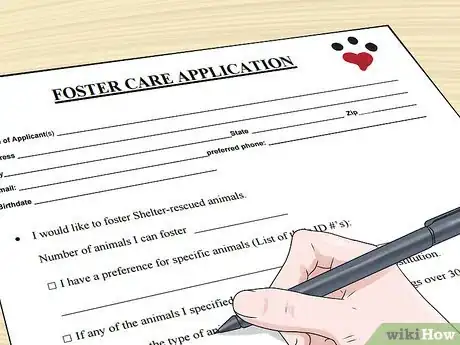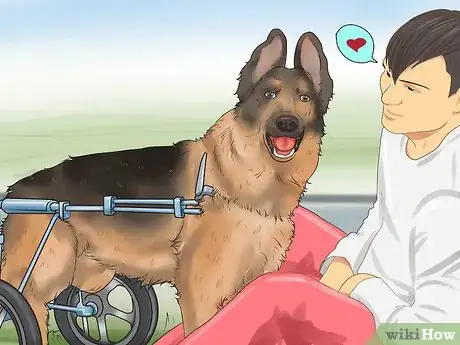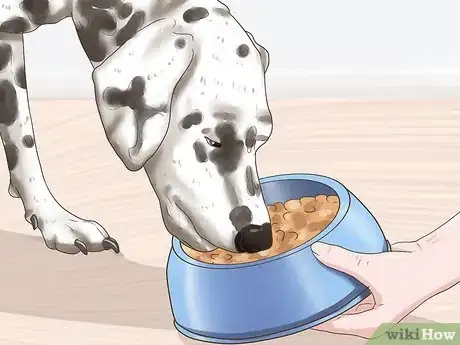This article was co-authored by Melissa Nelson, DVM, PhD. Dr. Nelson is a Veterinarian who specializes in Companion and Large Animal Medicine in Minnesota, where she has over 18 years of experience as a veterinarian in a rural clinic. She received her Doctor of Veterinary Medicine from the University of Minnesota in 1998.
This article has been viewed 15,692 times.
Senior dogs often have a difficult life in shelters. If you are a compassionate individual or family, you may want to help senior dogs by providing a foster home. Fostering senior dogs is no walk in the park. You will need to consider the time, expenses, and animal husbandry challenges that may be involved in caring for an older dog. If you are keen to give a senior dog another chance on life, you can apply to foster a dog at your local rescue organization. If successful, you will have the joy of another animal in your life until a permanent home can be identified.
Steps
Applying to Foster Senior Dogs
-
1Reflect on your living situation and availability. Fostering a senior dog may take quite a bit of adjustment and is only possible if you can provide the right environment and a significant amount of your time. If you can’t provide these things, then you may not be ready to foster or you may need to make some changes. Some things you may need to ask yourself before committing include:
- Do I have a lot of stairs in my home or leading up to my doorway that a senior dog may have challenges with?
- Would a senior dog get along well with my current pets?
- Does my landlord allow animals (if renting)?
-
2Figure out what kind of senior dog you want to foster. If you have experience with a particular breed of dog, it is probably best to apply to foster a senior dog of that breed. Your knowledge of food and care for that breed will be invaluable as a foster parent and the rescue organization will be pleased to find you. If you feel a connection to a particular senior dog who needs a foster parent, you may want to honor this feeling.[1]Advertisement
-
3Find a rescue organization in your region. Ask your veterinarian if they know about a reputable dog rescue organization in your area. You should also ask them if they know of a rescue organization that has the specific breed you are looking for. Many rescue organizations have a hard time caring for older dogs and depend on compassionate foster parents, so they will be happy to hear from you.[2]
- Search the Petfinder website for a local rescue organization: https://www.petfinder.com/animal-shelters-and-rescues/search
-
4Request a foster application. Start by asking the rescue organization for an application to foster a senior dog. If you visit the organization in person, they should be able to give you a paper copy of the application. You can also start getting to know the people at the rescue, with whom you will have to work closely as a foster parent. You may also be able to email the rescue to request an application form.[3]
-
5Review the foster application. Look at the details of the foster application. You want to find out what the rescue organization requires of the foster parent in terms of costs, everyday care, and finding the senior dog a forever home. You should ask the rescue organization a number of key questions about costs and care:[4]
- What costs will I incur as a foster parent?
- Do you continue to pay for veterinary costs while I foster the senior dog?
- Will I be paying for dog food?
- How much assistance is offered in finding the senior dog a permanent home?
- How are visits scheduled with prospective adopting parents?
-
6Finish the application process. You will need to finish the application process, which may involve personal and veterinary reference checks. You should make sure you give the rescue organization good references for both your character and your animal husbandry abilities. Finally, you may need to let the rescue organization inspect your home and yard to determine suitability for fostering.[5]
Taking Care of Senior Dogs
-
1Budget for fostering. Typically, the rescue organization will take care of veterinary costs but you will have to pay for dog food and perhaps some other incidentals like leashes. You should allocate sufficient financial resources to foster a senior dog such as money for food, shelter, and whatever additional costs are not covered by the rescue organization.[6]
-
2Make sure you have the right husbandry skills. Senior dogs may have any number of ailments and behavioral disorders. Prior to taking in a senior dog, you should make sure you know how to deal with its’ various ailments or behavioral issues. You may also need an open heart and a sense of humor.
- If the senior dog is in a wheelchair, make sure you know how to operate a dog wheelchair. Ask the rescue organization for information on wheelchair operation.
- If the senior dog has aggression issues, make sure you have some experience with training aggressive dogs.
- If the senior dog has a specific medical condition, remember to ask the rescue organization for appropriate care information.
-
3Spend time with your senior dog. Take the time to give your senior dog some exercise or a walk around the block. You will also need to spend some time just hanging out with your senior dog. As a whole, you may spend an hour a day caring for your senior dog. If you have other dogs, you can probably allocate this time for all of your dogs by taking them on walks together and hanging out as a family.[7]
-
4Feed your senior dog. You can purchase senior dog food formulations. You might also want to check with your rescue organization for dietary recommendations when you take in your foster dog. In general, senior dogs do better on low-calorie diets because they need less energy and are at risk of becoming overweight.[8]
- Sometimes, senior dogs have special dietary needs. There are different foods and diets that help with certain issues such as joint/mobility problems, kidney issues, and dermatological problems.
-
5Cope with unexpected circumstances. If you encounter circumstances in your life that make fostering unmanageable, you should contact your rescue organization. Since moving is stressful for senior dogs, you should try to avoid the scenario of having to return your foster dog. If your situation is dire, you should give your rescue organization at least a few weeks of warning so that they can find a replacement foster home for your senior dog.[9]
Finding Your Senior Dogs a Forever Home
-
1Take your senior dog to the dog park. Socialize with other dog owners and let the community know that you are currently fostering a senior dog from a rescue organization. By talking to fellow dog owners in your community, you may be able to identify a prospective permanent home for your senior dog. If you find a prospective owner for your foster dog, you should connect them with the rescue organization. The rescue organization will be in touch with you and the prospective owner about next steps in the adoption process.
-
2Ask the rescue organization if they have found a home. Your rescue organization will receive inquiries about adoption, so it is important to remind them that you have a foster dog in your home. Your rescue organization may use a number of tools, networks and events to link foster dogs with permanent homes.[10]
- Your rescue organization may schedule visits with adopting parents at your home or elsewhere. You should ask them how this works.
-
3Advertise on social media. Post pictures and information about your foster dog on Facebook, Instagram, twitter and other social media. If you let people in your network know about your friendly and loving senior dog, hopefully the word will get out and a friend or acquaintance will jump at the opportunity to offer the foster dog a permanent home.[11]
-
4Bring your foster dog to a community adoption event.[12] Your city or region may host community adoption events for dogs or cats in need of a home. If you cannot find a community adoption event in your area, talk to your rescue organization and community members about planning an event. Adoption events are a great way of promoting animal welfare and connecting foster dogs to permanent homes.[13]
- Find a suitable date and location. Try to find a date that does not conflict with other major events in your region and a location that is accessible to a wide range of pet enthusiasts.[14]
- Determine your budget. You should budget for food, drinks, marketing, pet supplies, cleaning, and any rental fees for the event location.[15]
- Promote your event at the dog park and on social media.
- Collect donations for senior dogs at the event.
- Find people to adopt senior dogs.
-
5Adopt your foster dog. If you grow attached to your foster dog after many months, you may also choose to adopt it. Alternately, if you cannot find a suitable permanent home after a long time trying, you may decide to simply adopt your foster dog. If you make this decision, you should talk to your rescue organization about next steps in adopting the dog.
References
- ↑ http://www.srdogs.com/Pages/foster.html
- ↑ https://www.petfinder.com/animal-shelters-and-rescues/fostering-dogs/best-dog-foster-care/
- ↑ https://www.petfinder.com/animal-shelters-and-rescues/fostering-dogs/best-dog-foster-care/
- ↑ https://www.petfinder.com/animal-shelters-and-rescues/fostering-dogs/best-dog-foster-care/
- ↑ https://www.petfinder.com/animal-shelters-and-rescues/fostering-dogs/best-dog-foster-care/
- ↑ http://www.srdogs.com/Pages/foster.html
- ↑ http://www.srdogs.com/Pages/foster.html
- ↑ http://pets.webmd.com/dogs/guide/senior-dog-food
- ↑ http://www.srdogs.com/Pages/foster.html
- ↑ http://www.cityofelderlylove.org/foster
- ↑ http://www.cityofelderlylove.org/foster
- ↑ http://www.cityofelderlylove.org/foster
- ↑ https://www.petfinder.com/animal-shelters-and-rescues/volunteering-with-shelters-and-rescues/how-to-organize-a-local-adoption-event-in-your-community/
- ↑ https://www.petfinder.com/animal-shelters-and-rescues/volunteering-with-shelters-and-rescues/how-to-organize-a-local-adoption-event-in-your-community/
- ↑ https://www.petfinder.com/animal-shelters-and-rescues/volunteering-with-shelters-and-rescues/how-to-organize-a-local-adoption-event-in-your-community/
About This Article
If you want to foster a senior dog, make sure you're aware of how to deal with any ailments or behavioral issues they may have. You'll also need enough time to look after the dog, which will have more care needs than a younger pet. Additionally, feed it a dog food formulated for senior dogs, which will contain fewer calories than normal foods. To go through with the fostering, fill out an application form at your local rescue center, and organize a home visit so the center can assess your living situation. For tips from our Veterinary co-author on how to find a permanent home for your fostered dog, read on!







































































